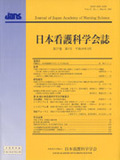Japanese
English
- 販売していません
- Abstract 文献概要
- 参考文献 Reference
- サイト内被引用 Cited by
要旨
本研究は,片麻痺を伴う脳血管障害からの回復過程における患者の身体経験とその意味を,発症から6週間の期間に焦点を当て,日常の看護を通して明らかにすることを目的とした.本研究は,Heideggerの存在論とMerleau-Pontyの身体論を前提的立場とし,テーマ分析は,Bennerの解釈的現象学に基づいて行った.結果,患者は,《よそ者の身体》,《目覚める身体》,《向き合う身体》,《自分自身の身体》という4つの段階を踏んで回復していくことが明らかとなった.なかでも,《目覚める身体》は,《よそ者の身体》の中で,表立たずに芽生えはじめ,《向き合う身体》への架け橋となっていると捉えられた.これらの過程は,“心身分離状態からの解放”を表しており,そしてこの意味は,世界から閉ざされた身体が過去と現在を統合させながら,動作や道具を獲得し,それを習慣化させていくという仕方で,親密性をもって再び世界に開かれるようになることであると解釈された.
Abstract
This study aimed to clarify the bodily experiences and their meanings of patients who have had a stroke complicating unilateral limb weakness, through everyday nursing, focusing on the recovery process of the 6-week period from onset. This study took the philosophical stance of Heidegger's ontology and Merleau-Ponty's phenomenology as embodiment. This data was analyzed based on Benner's interpretive phenomenology. The results showed that patients had recovered through four stages: “stranger's body”, “awakening body”, “interacting body (with mind and external world)”, and “one's own body”. Of these stages, the “awakening body” started to develop within the “stranger's body” without surfacing, and which was recognized to create a bridge toward “interacting body”. It was interpreted that these stages had indicated “the release from the dissociation of mind and body” and that it meant that the body shut off from the world had obtained action and tools while unifying the past and present and had become open again to the world with intimacy on the way of making them habit.
Copyright © 2007, Japan Academy of Nursing Science. All rights reserved.


